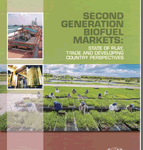
UNCTAD has recently published a new report on second-generation biofuel markets seeking to provide public and private practitioners with a macro-picture of the advanced biofuels sector, with a specific focus on cellulosic ethanol as of 2015-2016.
By carrying out a non-exhaustive mapping of cellulosic ethanol projects and recent policy lessons around the globe, the report focuses also on how to promote technology transfer for developing countries interested in engaging in advanced biofuel markets for the attainment of the Sustainable Development Goals and as an instrument to meet their commitments under COP21.
The report concludes with five suggestions for the responsible development of the second-generation biofuels industry:
- Create regulatory frameworks for advanced bioenergy tailored to national circumstances, which do not necessarily focus on the type of supply but instead on existing local demands. The fulfilment of such regulations is likely to meet domestic development strategies in line with the SDGs.
- Promote cooperation between domestic organizations and foreign companies for joint ventures by means of investment agreements in order to facilitate technology transfer. This is important to avoid the emergence of a large technological gap between first-generation, land-intensive feedstocks and second-generation, capital-intensive biofuels in developed and developing countries.
- Consider the broader aspects of bioeconomy sectors, including biomaterials, in ways that avoid locking industrial development paths into specific sectors or technologies. This would provide flexibility for market players that operate biorefineries as they could target multiple markets, including materials, feed, food and energy – both domestic and internationally.
- Incorporate lessons from the sustainability criteria applied for first-generation biofuels into near and mid-term sustainability provisions or labels for advanced biofuels
- Continuously promote technical dialogue among different production regions of advanced fuels in order to ensure compatible standards for feedstock and promote trade in advanced biofuels.


